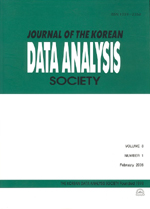경제적 불확실성이 출산 의사결정에 미치는 효과
The Effect of the Economic Background Risk on Fertility Decision: Using Censored and Zero Inflated Count Data Regression
- 한국자료분석학회
- Journal of The Korean Data Analysis Society (JKDAS)
- Vol.13 No.3
-
2011.061521 - 1531 (11 pages)
- 127

본 연구에서는 저출산의 유의한 요인으로 거론되고 있음에도 불구하고 현재까지 국내에서 엄밀한 실증분석이 이루어지고 있지 않은 요인, 즉 한 가구의 가장 및 배우자의 직업 안정성이 그 가구의 출산 의사결정에 미치는 효과를 분석함으로써 경제적 불확실성이 출산 의사결정에 미치는 효과를 살펴본다. 직업안정성을 위한 대리변수로 직업 종사상 지위를 정규직, 비정규직, 무직으로 구분하여 한국노동패널(KLIPS) 7차년도 자료 중 가구주가 아버지인 2,164 가구의 자료를 중도절단된 포아송 회귀분석과 중도절단된 음이항 회귀분석을 사용하여 추정한 결과 자녀 수는 아버지가 정규직, 비정규직, 무직일 때의 순으로 많으며, 어머니가 비정규직인 경우 가장 많은 것으로 나타난다. 또한 금융자산 규모가 커질수록 자녀 수는 감소하는 것으로 나타난다. 이러한 결과들은 한 가구의 미래 소득 흐름에 대한 불확실성의 증대가 자녀 수를 유의한 정도로 감소시킬 수 있음을 보여준다.
We in this paper investigate the effect of a job security on the fertility decision of a household. A job security is directly related to the economic uncertainty of the future income flow of the household. Thus our analysis may be able to be regarded as an investigation of the effect of an economic uncertainty on the fertility decision. We use the job status variables as proxy variables for the job security. Running a censored Poisson regression and a censored negative binomial regression for the data where father is the head of a household among KLIPS data, we find that the job security for father could increase the number of children while the number of children of the household in which mother has non-regular job tend to be more than that of the household where mother is with a regular job or unemployed. Moreover, the number of children is negatively related to the amount of financial investment. These results suggest that an increase of economic uncertainty via the uncertainty of future income due to job insecurity for the head of a household could lead to having less children.
1. 서론
2. 선행연구
3. 분석모형 및 분석자료
4. 분석결과
5. 결론
참고문헌
(0)
(0)